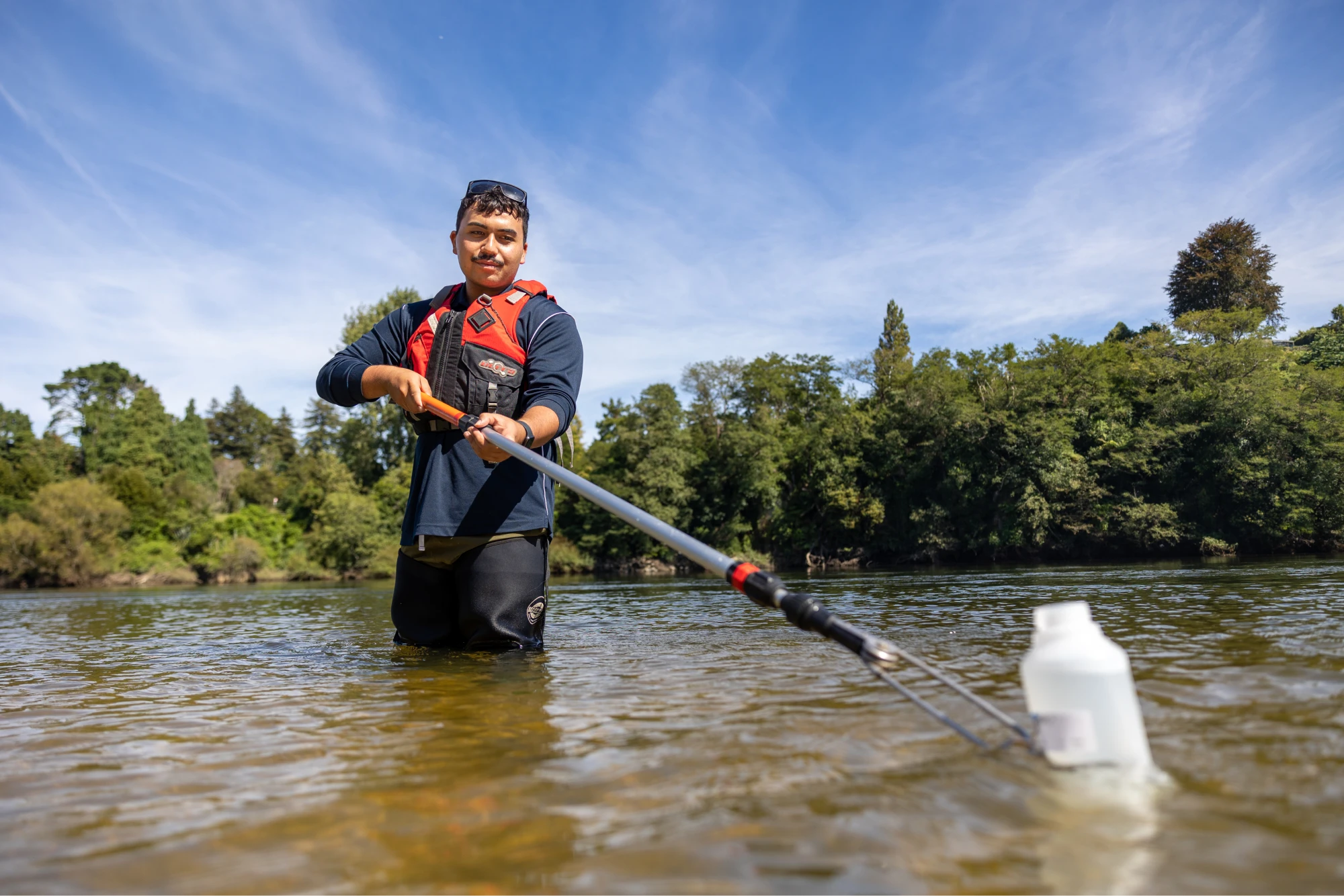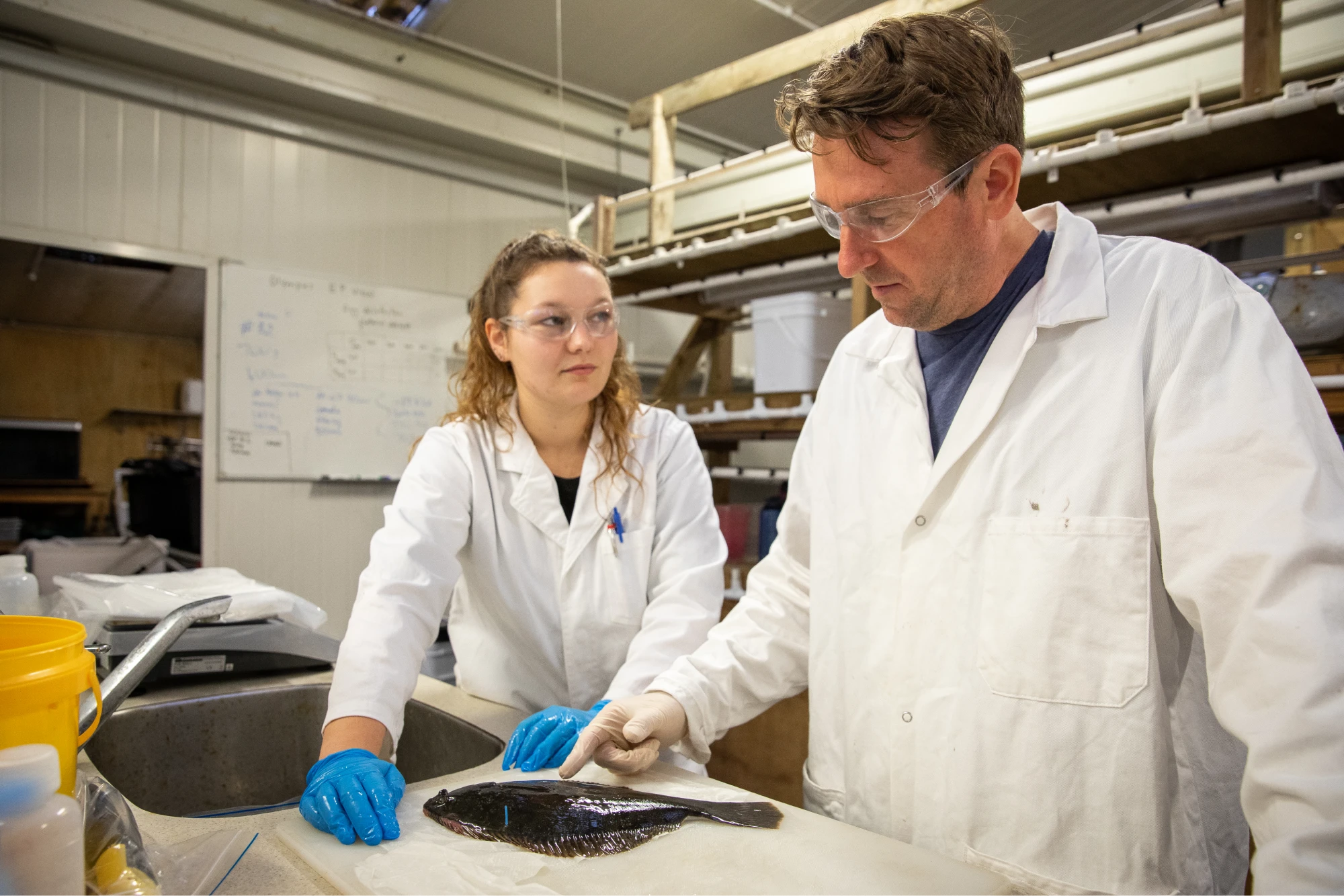Current students: early stage
A guide for early-stage doctoral students covering conditional and confirmed enrolment, annual re-enrolment, and six-monthly progress reporting.
Starting PhD or Higher Degree study
Find detailed information about the life cycle of doctoral study.
This information takes you from conditional enrolment through to confirmation of enrolment, and covers annual re-enrolment and six-monthly progress reporting.
There is also information available for those who are considering studying off-campus, or for international students who plan to travel overseas while enrolled.
We also encourage all research degree students to become familiar with the code of conduct that relates to research.

Doctoral life cycle
Learn more about the life cycle of doctoral study — from conditional enrolment through to confirmation of enrolment and the necessities of annual re-enrolment and progress reporting.
The University of Waikato values its associations with industry, commerce and Crown Research Institutes, Centres of Research Excellence, and other universities, both in New Zealand and overseas.
Such associations provide stimulating and intellectually challenging opportunities and experiences for its research staff and students.
The University seeks to manage its relationships with external organisations, in such a way to maintain the high quality and autonomy of its programmes of teaching and research.
Guidelines for higher degree students working in collaborating institutions
The University is responsible for the academic programme and supervision of enrolled higher research degree students, and for the examination of their work. The University must be closely involved with collaborating institutions to ensure that students are making appropriate progress. Accordingly, students may be permitted to undertake research with and/or based in collaborating institutions, only when the project is specifically approved and the following criteria are satisfied:
- Resources: (a) the resources of a collaborating institution are appropriate for the needs of the student.
- Resources: (b) the collaborating institution will agree to the student having access to all necessary resources.
- Support: the staff from the collaborating institution who will provide day-to-day support for the student, are willing, able and qualified to assist the student.
- Stimulation: the collaborating institution is able to provide a stimulating research environment.
- Access: the collaborating institution will provide University supervisors with ready access to the student and to the research facilities used by the student.
Students are encouraged to present seminars both in the collaborating institution and in the University.
The University expects its supervisory staff to work actively in the field of the student's research and, where co-supervision is being provided by the staff of a collaborating institution, to share in joint publications with the student and other co-supervisors.
Contractual arrangements
Formal contractual terms and conditions for a student to work within an external organisation and to receive support by way of scholarship, study award, access to facilities and other benefits must be carried out through the Research & Enterprise Office.
These terms and conditions will also include agreements on publication rights and ownership of intellectual property (IP), progress reports, and submission and examination of theses.
The student will normally be required to sign an agreement with the University which sets out the rights and obligations of the student, for the contract with the external organisation and for the student's supervision arrangements while in the contract.
Guidelines for unsupervised study or field work
There are situations when students who are based in the University may be absent from the campus for extended periods of time, for example, when involved in field work or study in libraries or museums. This does not cover the situation when the student is formally attached to another organisation and is being supervised by a member of that organisation (as detailed above).
Students working at a distance suffer many disadvantages not common to students working on campus or within a large institution. The Chief Supervisor of students wishing to work at a distance from the University campus should therefore:
- carefully assess the student's capability to plan and organise work independently
- maintain regular (at least monthly) contact
- keep a record of important matters and decisions covered during meetings
- be satisfied that the student has access to all the resources required
- set and expect frequent and regular tangible goals — e.g., thesis chapters, conferences, to be achieved over the course of study
- make regular checks to ensure the student is following the agreed research plan
The student should plan to spend some significant periods on campus, as agreed with the supervisor and Head of School, or have other contact with people working in his/her field so that progress can be discussed in detail.
It is expected that the following matters would be discussed with the student as appropriate and agreed actions documented:
- method and frequency for maintaining contact between student and supervisor/s
- objectives to be achieved in the exercise and reporting on those objectives
- resources required
- people who could provide informal assistance to student
- contacts, authorisation or letters of introduction that may be required
- whether the student has had adequate training in the methodology and/or equipment to be used
- potential health and safety hazards and whether the student has been adequately briefed/trained where necessary, and has adequate equipment to minimise the identified risks.
Domestic students
Domestic doctoral students (NZ citizens and NZ Permanent Residents) are permitted to travel overseas for research purposes during their programme of study, after reaching confirmed enrolment.
International students
International doctoral students are required to inform the University of all overseas travel while enrolled.
To remain eligible for domestic fees, only temporary absences are permitted and only for the purpose of doctoral research.
It is important to note that:
- Absence must be no more than 12 months, either accumulated or a block over the duration of the higher degree programme of study;
- The 12-month rule does not include time taken as annual leave.
Any international student (excluding NZ citizens and NZ Permanent Residents) wishing to travel overseas to undertake research while enrolled, must complete a Doctoral Overseas Travel Form.
Annual leave
A student may spend up to four weeks per year on annual leave while enrolled, arranged in consultation with their Chief Supervisor; and that leave may be taken overseas. If you are travelling overseas for annual leave, please email the School of Graduate Research so we can update our records.
Where personal leave is for a period of four weeks or greater, it may be necessary to apply for a suspension of enrolment through MyWaikato.
It is expected that researchers are committed to the highest standards of professional conduct when undertaking and supervising research. Researchers in this context are University staff members and postgraduate students.
These standards include:
- Rigorous opposition to all forms of fraud, including misrepresentation and falsification of results.
- Observance of the highest standards of safety in relation to themselves, their co-workers and research participants.
- Maintenance of confidentiality where appropriate and full attribution of the sources of assistance and guidance.
- Acknowledgement of authorship of all published material.
Researchers should participate only in work which conforms to agreed ethical standards and which they are competent to perform.
Disclosure of potential conflict of interest
Disclosure of any potential conflict of interest is essential for the responsible conduct of research. Such disclosure must be made to the relevant authorities which will include a funding or sponsoring agency and the chairperson of the relevant department or research centre of the University.
Any such declarations to outside organisations should be made through the Research & Enterprise Office and will require the approval of the Deputy Vice-Chancellor Research.
Health and safety
Institutions and research workers have a responsibility to ensure the safety of all those associated with research. Staff should ensure that all research workers and students under their supervision are aware of the relevant codes and policies on health and safety, and receive appropriate instruction and information of such codes and policies.
Misconduct in research
- Fabrication of data — by claiming results where none have been obtained.
- Falsification of data — by changing records or falsely claiming the use of techniques, methods or levels of precision.
- Plagiarism — including the direct copying of handwritten, typed, printed or published text or notation; use of other people's data, arguments or literature reviews without appropriate acknowledgement or permission; and deliberate use of published or unpublished ideas from other people without adequate attribution or permission for such use.
- Misleading ascription of authorship — including listing of authors without their permission where this is relevant, attributing work to others who have not contributed to the research, and failing to acknowledge work primarily produced by a postgraduate student, trainee or associate.
- Other practices that deviate from those accepted within the research community — for proposing, conducting or reporting research, such as intentional infringement of the University's code of ethical behaviour.
Misconduct does not include honest error or honest difference in the interpretation or judgement of data.
Procedures for dealing with misconduct in research are set out in detail in the "Handbook for Research and Outside Professional Activities" available to University of Waikato staff on the website or from the Research & Enterprise Office.
Inclusion of a student’s published work in their doctoral thesis
Doctoral students are encouraged to publish material they have developed as part of their doctoral thesis research during the time of their doctoral enrolment.
There are two ways of including this material in the thesis submission. One way is through a PhD with Publication, which includes the actual publications as chapters in the thesis. The other way is by referencing the publication(s).
If you are not submitting the publications as part of the thesis, you cannot duplicate material from those publications in the thesis. You need to appropriately and fully reference the work as you would any publication by other authors that are in the public domain.
Referencing your own previously published work is known as self-citation. It is important to give citations when ideas, data, etc have been discussed in your previous publications. Correct self-citation conveys the level of originality in a publication accurately and enables readers to understand the development of ideas over time.
If you have produced publications from the thesis research that are not included in the thesis in their entirety, but which play an important role in the original contribution made to knowledge by the thesis research, you should, within the body of the thesis and likely in the introduction, detail the publication that has come out of the thesis research. This is in addition to fully referencing that publication. If the publication was co-authored you should provide details of your contribution and the other authors’ contributions to that publication. You should also complete a Co-authorship Form and include this in the thesis appendices.
Guidelines for Authorship of Publications from Theses and Dissertations
The Guidelines for Authorship of Publications from Theses and Dissertations are designed to provide students and staff with clarity around the authorship and publication of work contributing to and deriving from student research theses/dissertations/and projects. The guidelines seek to ensure that all contributing and participating authors of a published work developed out of, or as part of, a thesis/dissertation/project receive the appropriate level of recognition for their work.

Postgraduate Researcher Development Programme: early stage
The University of Waikato offers a wide range of training opportunities to support you on your journey as a research scholar. If you are pre- or post-confirmation, and/or undertaking your literature review, these workshops are for you.